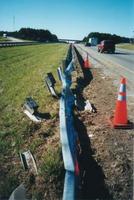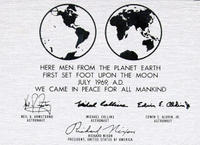 2. In the movie Ella Enchanted, the title character was under an evil spell which caused her to comply with whatever command was given her without hesitation. I know this included verbal commands, but did it include written ones as well? For example, if Ella was driving down the road and noticed an Arby's sign which said "Try Our New Beef and Cheese Sandwich," would she be obligated to pull in and order one?
2. In the movie Ella Enchanted, the title character was under an evil spell which caused her to comply with whatever command was given her without hesitation. I know this included verbal commands, but did it include written ones as well? For example, if Ella was driving down the road and noticed an Arby's sign which said "Try Our New Beef and Cheese Sandwich," would she be obligated to pull in and order one?3. If things (such as planets) get hotter the closer they are to the sun, and if hot air rises, then why are the tops of mountains cold places instead of burning hot? It seems to me that, since they're closer to the sun, mountaintops should be the places that people go to when they want to sunbathe or escape the cold. Consequently, why aren't the lowest places on Earth -- those farthest away from the sun -- the coldest? This would mean that a place such as Death Valley would be covered in snow year-round, and the Dead Sea would be frozen much of the year and would become the site of lots of ice skating. Why is it just the opposite?
4. If a man had dual citizenship, and the two countries he was a citizen of declared war on another, and he was subsequently drafted by both countries, what would he do? Would he be obligated to try to kill himself, or at least beat himself up pretty badly, since one half of him would be officially at war with the other half?
 5. I find myself pondering two issues about guard rails on roadways. The first is: when there's some minor damage that's been done to a guard rail -- say, when it's been slightly dented by an errant car -- why do road crews come out and spend time erecting big orange signs saying "Guard Rail Damage Ahead?" Couldn't they have used the same muscle power and time needed to transport and erect those heavy signs to just bang out the dent in the guard rail, and thereby negate the need for a sign in the first place?
5. I find myself pondering two issues about guard rails on roadways. The first is: when there's some minor damage that's been done to a guard rail -- say, when it's been slightly dented by an errant car -- why do road crews come out and spend time erecting big orange signs saying "Guard Rail Damage Ahead?" Couldn't they have used the same muscle power and time needed to transport and erect those heavy signs to just bang out the dent in the guard rail, and thereby negate the need for a sign in the first place?6. And speaking of those "Guard Rail Damage Ahead" signs, what is their purpose? What are drivers supposed to do with the information that the guard rail up ahead is bent or banged up? Is this for tourists who want advance warning so they can slow down and take a picture? ("Now this next slide shows a guard rail we saw banged up just north of Old Faithful in Yellowstone National Park. Oooh-wee, look at that big dent there!") Or, are they designed for people, say, who want to commit suicide by driving off bridges into creeks and rivers, and the signs show them the places where their car will have an easier time of it because the guard rail's already been weakened?
7. After singer Ella Fitzgerald did those popular TV commercials for Memorex back in the 70s and 80s, the ones showing her hitting a high note and shattering a wine glass, did sales of her recordings plummet, as anxious homeowners sought to protect their glasses and china from destruction? Did diehard Ella enthusiasts have to construct foam-padded listening rooms to placate frightened spouses?
 8. Finally, we've been told that when the Apollo 11 astronauts became the first men on the moon in July 1969, they left behind a plaque on the moon's surface which read "Here Men From the Planet Earth First Set Foot Upon the Moon, July 1969 A.D., We Came in Peace For All Mankind." And we've even seen supposed images of the plaque, like the one here. But can we be sure that's really what the plaque says? I mean, have any of us gone to the moon and seen it? What if, instead, the plaque the astronauts really left contained a map with the Soviet Union and China highlighted in red, with the message, "If You're Looking to Destroy Something, Attack These Red Parts First"?
8. Finally, we've been told that when the Apollo 11 astronauts became the first men on the moon in July 1969, they left behind a plaque on the moon's surface which read "Here Men From the Planet Earth First Set Foot Upon the Moon, July 1969 A.D., We Came in Peace For All Mankind." And we've even seen supposed images of the plaque, like the one here. But can we be sure that's really what the plaque says? I mean, have any of us gone to the moon and seen it? What if, instead, the plaque the astronauts really left contained a map with the Soviet Union and China highlighted in red, with the message, "If You're Looking to Destroy Something, Attack These Red Parts First"?
7 comments:
The Ella Enchanted book is much better than the movie. I don't think it mentioned written commands, but she did have to follow ones in other languages.
...things that make you go "hmmmm..."!!!
I can actually answer number three - the sun averages 93 million miles from the earth, so an extra three or four miles don't make a lot of difference on that scale. The big factor thus becomes the air - it acts as insulation, trapping heat. The thicker that insulation, the more heat you retain. (Since water blocks out the sun at depth, it has the opposite effect because the rays of the sun never reach deeply enough to similarly warm it.)
Also, the directness of the sun's rays make a difference to how much energy gets absorbed v. deflected; the Northern Hemisphere is closer to the sun during the winter than the summer, but, being tilted away, it gets a/ less sunlight and b/ indirect sunlight.
You do understand, I was chosen "Supreme Pedantic Egghead" on my old AOL message boards!
I didn't understand a word you said, Nightfly, but you sure talk swell.
I knew somebody could answer that question! I also knew it wouldn't be me.
I'd try for question one but we don't have tornadoes here. Just earthquakes and tsunamis.
...could you repeat that only "slower" this time, Nightfly???
...things that make you go "hmmmm..."!!!
LOL - sorry. Much more indirectly: think of air as a blanket. The heavier the blanket, the warmer you are. At the very top of a mountain, you have a single sheet's worth of air; in Death Valley you have the sheet, two blankets, and a quilt. QED.
It doesn't work for water because it's TOO thick, and the heat from the sun can't get down there in the first place.
Post a Comment